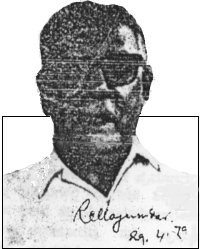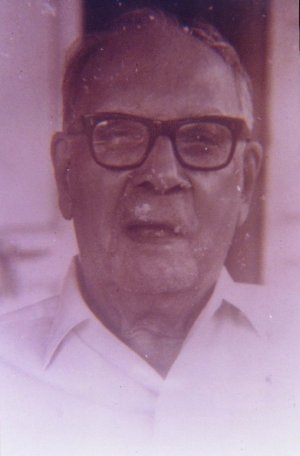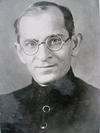Interview with R.C. Majumdar
The history may repeat itself but great historians like Dr. R.C. Mazumdar are rarely born again. Just before he passed away in 1980, I met with him at his residence in Calcutta. Excerpts from the interview.
-- Jyotsna Kamat
Interview conducted on April 29, 1979
Article First Published: May 1980 in Mallige Monthly
This Web Page Last Updated: December 07, 2024
Ramesh Chandra Majumdar was born in 1888 in East Bengal (present day Bangladesh) in the village of Khandarapara of Faridapur District. His talent knew no bounds, like the Padma (Podda) river that flows there. The story of this famous historian is also interesting. In East Bengal, there are rivers, lakes, and streams everywhere, and children grow up with water. In Majumdar's house, even to go from one room to another, he had to walk in ankleful of water! When it poured, the whole house was flooded. When he was an infant, one day he was about to be swept away in the floods in the night. "Somehow my aunt was woken up, and I am alive today to tell you my story." -- He laughed.
Childhood Memoirs
"In those days, there were neither buses nor trains; there were not even the roads. So learning swimming was inevitable. No need for fuel, no need to stand in the line (in 1980 when this interview was held, there was fuel shortage in India and it was common to stand in a queue for hours to purchase kerosene or petrol), just jump into the water and swim to the destination! When we went to school we used to make rafts from the banana tree stamps or hollow palm logs to stay dry. There were palm leaves to write upon, but in my school, we preferred banana leaves as they were available in plenty. We used sharp bamboo sticks to write on them. There were no girls in my class. Probably helping boys to focus on learning." He winked and laughed.

R.C. Majumdar 1888 - 1980
"The girls were married when very young. It was believed that an educated woman is bad for husband's longevity and education was not offered to them. (see also: Women of India section at this site) They taught us using textbooks written by Ishwar Chandra Vidyasagar. When I graduated after learning in Dhaka and Calcutta, I did not know if I was a good student or others were bad students!" He laughed.
I went to his house on Bipin Pal Road near Lancedown Highway which was as big as his personality and fame. I was told that he did not accept visitors but when I rang the bell, the doorman (darawan) welcomed me and said that he would get the big boss (bodo babu). A grand oil painting of smiling Swami Vivekananda welcomed me into the drawing room and another of the Taj Mahal proclaimed the historian's taste and stature. The furniture was museum quality antique and very comfortable. It was hard for me to believe the tall, fair and graceful man who came out was actually Professor Majumdar who was past his 90.
Vice-Chancellor
"I was encouraged by Ashutosh Mukherji to take up graduate studies and was ranked 1st to the university. In those days, the most attractive job was that of a deputy magistrate. I had gotten through the preliminary interviews, but just as I was to leave for the final interview to complete the process, my wife fell ill, and I could not go. My life changed completely because of this. I became a teacher instead. I took to research, and got a doctorate. When the University of Dhaka was started in 1921, I became its first professor. Even in those days, they paid me 1000 Rupees of salary a month with servants, house, and a car. Eventually I became the vice-chancellor of the university.
In those days, the teachers and professors earned that position through merit and the students respected them as well as loved them. However, there were problems. It was the time when Gandhi's ideology was taking the country by storm. During the Saraswati pooja (campus festivities) in the campus, some students and faculty wanted to involve the Harijans (low caste Indians a.k.a. the untouchables). But another student body opposed the move and ambushed me in my office. I patiently waited till their anger subsided, and quietly said that I was ashamed of my students for opposing such a novel idea. This did the trick, and the students now wanted to go one step ahead, and wanted to share a meal with the untouchables! I wonder how many educationists wield this type of influence today."
Comprehensive History of India
"Dr. K M Munshi liked my work on ancient Bengal and asked me to work on a comprehensive volume on Indian history. He introduced me to many great scholars. In my seventy years of career that work was to become a great achievement. Dr. Munshi was also a great researcher and historian, and I truly enjoyed working with him. We did have our differences, but he always let me prevail. Since I could not ignore his opinion, I had to include both view points often contradicting each other, in several places. It took 35 years to complete all the volumes! I was happy that it was completed before Munshiji breathed his last."
"Munshi believed that a government sponsored institution can never document history in a honest manner. I realized this truth in the later years. The federal government built an editorial board to document India's freedom struggle with me as the chief editor. I discovered that other fellow historians were so eager to write history glorifying their friends in politics that I had to get out. We should not write corrupted history, however bitter the proceedings may be. Many countries have the tradition of changing history as their leaders change. We should not let India become one of those. History should be written based on sound proof and reasoning and not focused around famous personalities."
Unambiguous Roots
"As new and more information is becoming available about Indian history, do you think we can expect some changes in what we have believed as our history?" -- I asked pointing to advances in carbon dating technology, satellite imagery and new findings during excavations.
"Indian history is based on strong foundation and I do not think its fundamentals will ever be altered. New information will only confirm what we have believed" -- said he.

R.C. Majumdar (1888-1980)
"I have been greatly influenced by Ramakrishna Paramahamsa and Swami Vivekananda. I distinctly remember seeing Swami Vivekananda in a public meeting. Two of my best friends became Sanyasis. The first one Madhanand went on to become the president of the Ramakrishna mission and another, became its vice president. When I went to Chicago in 1968, I went to the library where Vivekananda had spoken and retrieved his lectures. They gave me all kinds of cooperation. Even The Chicago Daily Tribune helped me by retrieving their archival microfilms. I do not know when such a day will come in our country where libraries assist the researchers."
Is Netaji Alive?
"Do you think Netaji Subhas Chandra Bose is still alive?" -- I asked him.
"It is true that I have a great admiration for Netaji , but my admiration has not blinded the historian in me. Many people still think he is alive and the tabloids published his pictures, but there is no reason for the great man not to surface. The investigation committee concluded that he died in an accident, but due to political reasons it was not made public. In 1977 the prime minister of India (Morarji Desai) invited me for my opinion on the matter and I told him that there is no way that Netaji is alive today. He may not have died in the plane crash, but may have been unfortunately eliminated by the Japanese or the Russian forces."
Lonely
"Professor Majumdar is a temperamental man. He may humiliate you"--my friends had warned me. I mentioned this to Dr. Majumdar. He smiled it aside and said --" I thank you for visiting an old man. From my personal experience, I tell you that no one should live for too long. I have everything one needs. Huge house, cars, servants around the house.. but no one close to me. My son lives far away and I have a daughter who visits me twice a week I lost a daughter sixteen years ago -- to whom my book on Vivekananda is dedicated -- soon followed by my wife. I look forward to my day."
Epilogue
Few months after this interview, On February 11, 1980 Dr. R. C. Majumdar passed away. He was 92. He was great scholar and a genius. His contribution to our nation and Indian history is unparalleled.
![]()
See Also:
-
Topics on Indian History at Kamat's Potpourri
-
Banga-Darshana -- topics on Bengal at Kamat's Potpourri
-
India's Historians -- biographies and interviews with other historians


